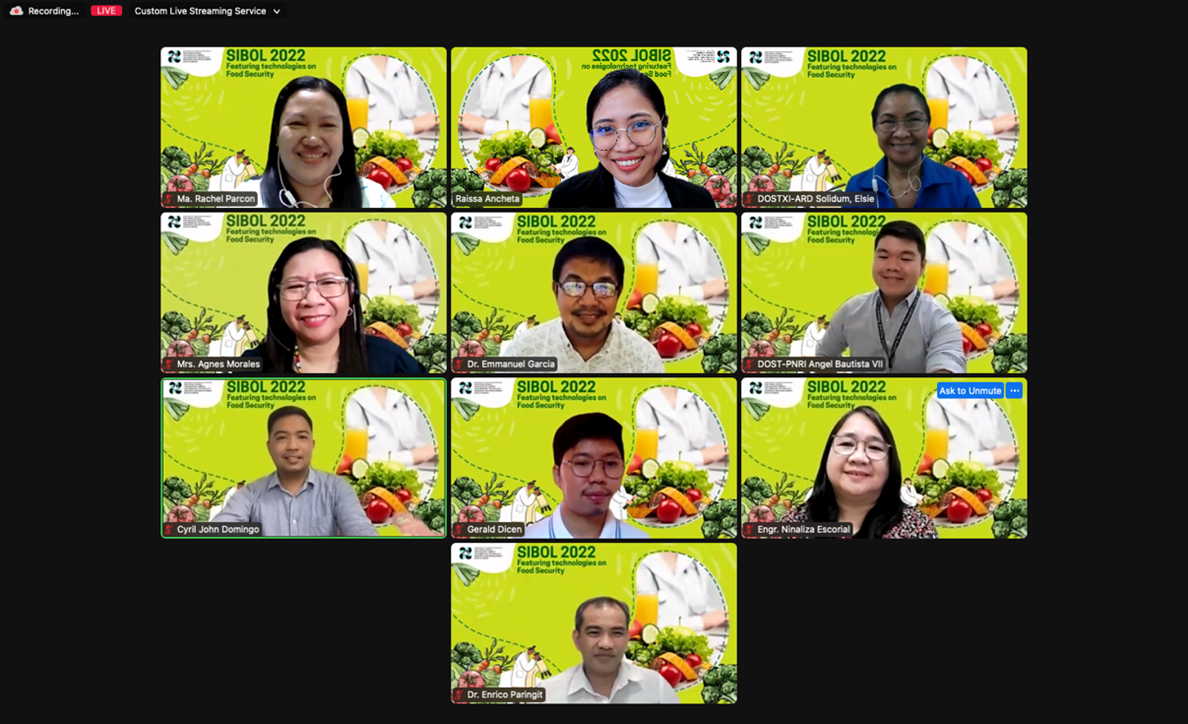

Screenshot of project leaders who presented their projects during the SIBOL 2022 on May 17, 2022 via Zoom
Next admin can capitalize on value-adding research on food
As the Philippines turns a new leaf with the conclusion of the national elections, the next administration can expect new technologies they can leverage to address the country’s problems on food security.
The Department of Science and Technology – Philippine Council for Industry, Energy, and Emerging Technology Research and Development (DOST-PCIEERD) is set to launch the second of the Science and Innovation Budding Opportunities for Leverage (SIBOL) 2022 on May 17 this year focused on food security.
DOST-PCIEERD Executive Director Dr. Enrico Paringit said that the projects featured in SIBOL can be used by the next administration to address the country’s concerns on food security.
“The technologies lined up have enormous commercial potential and can be further improved with proper funding.” Paringit said.
This year, DOST-PCIEERD is supporting 238 new projects this year with a total funding of more than Php 1.7 billion.
Presented in the second episode of SIBOL 2022 for Food Security are:
- Establishment and Operationalization of Integrated Research and Development Laboratory (IRDL) by the University of Antique (UA). The project seeks to capacitate the university, students, faculties, researchers, government agencies, and private industries in the province of Antique in their research and analytical testing needs through the establishment and operationalization of the IRDL Laboratory in UA.
- Establishment of ParSU – MTL (Microbiology Testing Laboratory) by Partido State University in Goa, Camarines Sur. The establishment of ParSu-MTL aims to provide services to the community with the help of LGU in assessing different food products being produced by different establishments.
- Upgrading of the Vacuum-Fried Fruits and Vegetables Production in the Western Visayas Food Innovation Center by the Guimaras State College. The project aims to upgrade the West Visayas Food Innovation Center’s equipment to maximize vacuum-fried fruits and vegetables production for micro, small and medium enterprises (MSMEs).
- Utilization of Banana Peel, Canistel Fruit and Brown Rice in the Development of Composite Flour by the Iloilo Science and Technology University. The project aims to utilize banana peel, canistel fruit (chesa), and brown rice as main ingredients in developing functional food for lactating mothers.
- Characterization and Utilization of Watermelon (Citrullus lanatus) Peels, Seeds, and Rinds Extracts as Food Preservative and Fortificant for High-Fat Foods also by UA. The project is based on the characterization and utilization of watermelon peels, seeds, and rinds extracts as food preservative and fortificant for high-fat foods.
- Adulteration Detection and Fingerprinting of Philippine Honey Using Stable Isotopes (Phase 2) by the PNRI. This project will pursue honey adulteration survey in the Philippine market, expand coverage of honey fingerprinting of bee species, convene national forums and feasibility study in establishing the National Isotopes Center – Food Authenticity Laboratory (NIC-FAL) to help protect the honey industry and its consumers from adulteration and fraud.
- Stable Isotope and Multi-Elemental Profiling of Coffee and Cacao Beans in the Philippines by IRMS and XRF for Origin Identification by the De La Salle University (DLSU). It aims to deep-dive into multi-elemental profiling of coffee and cacao beans in the country.
- Tracing the Geographic Origin of Philippine Carabao Mango Through ChemoIsotopic Fingerprinting by the Philippine Nuclear Research Institute (PNRI), DOST. This project aims to determine the traceability of Philippine carabao mangoes in the local market.
- Development of Halal Compliant Restructured Goat Meat Products Freeze-Dried Mango-Yogurt by Sultan Kudarat State University-Tacurong Campus. The project aims to develop technologies to make goat meat products and mango-yogurt snacks halal compliant. This has arisen from the growing demand for halal-certified products and consumers demanding convenience, variety, healthy, and quality meat and dairy products.
- Complementing Conventional Techniques with Isotope Techniques to Detect Inorganic Fertilizer Application and Haram Ingredients in Food Production by PNRI. The project will develop, optimize, and evaluate nuclear and isotope analytical techniques for the authentication and geographical fingerprinting of organic food, halal meat and gel capsules.
- Establishment of Halal Assurance Management System and Halal-compliant Standardized Process for Spa Skincare Products for the Halal Tourism Industry by the DOST-Industrial Technology Development Institute. The project will focus on the development and establishment of Halal Assurance Management System (HAS) and Halal-compliant Standardized Process on Spa Skincare Products such as massage and body oil, body scrub and body cream.
- DOST ETCH: Enhanced Testing Capabilities of DOST Halal Verification Laboratories (HVLs) in Support to Philippine Tourism Industry by DOST Region IV-A. The project aims to support Halal tourism development in the country through the provision of internationally accepted halal and tayyib tests for local products and provide technical assistance on the Halal assessment of hospitality industries.
- Development and Deployment of Halal Tourism Training Module and Halal Assurance Systems (HAS) to Secure Halal Compliance of Tourism Establishments by DOST Region XI. This project proposal intends to strengthen and secure compliance of tourism establishments and enterprises with Halal standards through the strengthening of three components: 1) Development and deployment of training modules on Halal Tourism, 2) Development of Halal Assurance Systems for selected tourism establishments and enterprises, and 3) Establishment of a Halal food service establishment which shall serve as a model for Halal food establishments in the country.
“We are confident that these projects will bear fruit and pay dividends in the coming years considering their potential to create or add value to our citizens and to our country.” Paringit said.
The SIBOL webinar series is a presentation to the public of new projects and programs that DOST-PCIEERD is funding and create awareness on the promising new projects and their potential impact to society.




